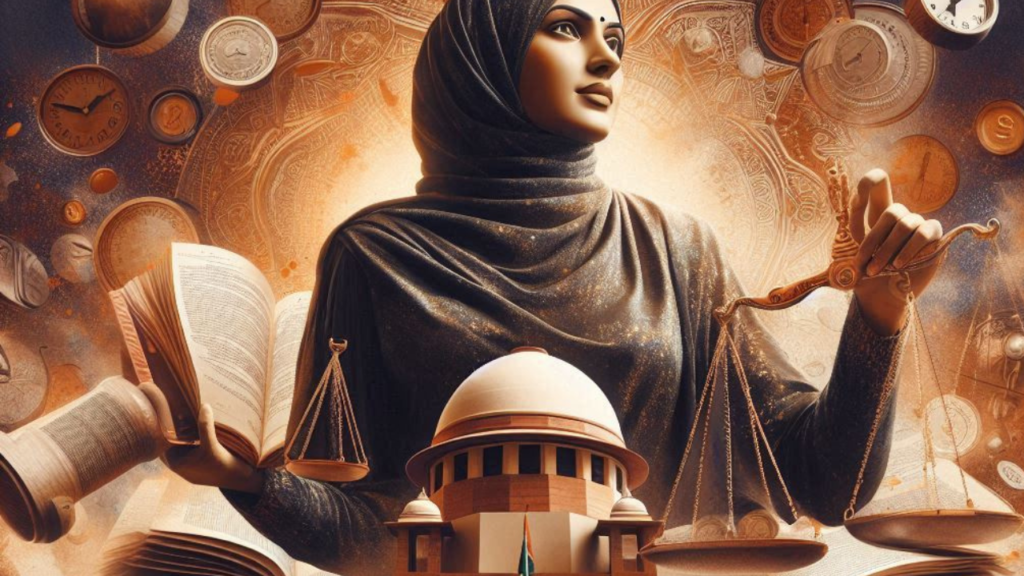Supreme Court Upholds Maintenance Rights for Divorced Muslim Women Under Section 125 CrPC
In a landmark ruling, the Supreme Court of India affirmed that divorced Muslim women are entitled to claim maintenance under Section 125 of the Code of Criminal Procedure (CrPC), regardless of their caste, creed, or religion. This decision marks a significant step towards gender equality and social justice.
Background of Supreme Court Ruling

Section 125 of the CrPC codifies the legal landscape surrounding maintenance for destitute wives, children, and parents. According to this provision, if any person “having sufficient means neglects or refuses to maintain” his wife, a magistrate of the first class may order that person to provide a monthly allowance for the maintenance of his wife. Importantly, the definition of “wife” includes a woman who has been divorced by, or has obtained a divorce from, her husband and has not remarried. This definition does not specify any religious affiliation.
Parallel to this secular law, the Muslim Women (Protection of Rights on Divorce) Act, 1986 (1986 Act) provides a specific procedure for Muslim women to claim maintenance during divorce. The 1986 Act was enacted in response to the Supreme Court’s 1985 decision in the case of Mohd. Ahmad Khan v. Shah Bano Begum, where the Court upheld a Muslim woman’s right to seek maintenance from her divorced husband under Section 125 of the CrPC. The verdict was met with controversy, as it was perceived by some as an affront to religious personal laws.
The Recent Ruling of the Supreme Court

In a recent case before the Supreme Court, a Muslim man challenged a Telangana High Court direction to pay ₹10,000 interim maintenance to his former wife. He argued that the maintenance claim should be governed by the provisions of the 1986 Act. However, the Supreme Court held that relief under Section 125 CrPC is a social security measure that operates independently of any Muslim personal law remedies. The Court emphasized that a parallel remedy under secular law cannot be foreclosed by existing personal laws.
The bench of Justices B.V. Nagarathna and Augustine George Masih pronounced separate but concurring judgments, upholding the rights of Muslim women. They recognized the critical role and sacrifices of homemakers and urged men to recognize their contributions by providing financial support. [3][4][5] The Supreme Court’s ruling applies to all married women, including Muslim women, who can now claim maintenance from their husbands under Section 125 CrPC.
Implications and Future Prospects of Supreme Court Ruling

This landmark ruling has the potential to open doors for oppressed women, regardless of their religious background. By prioritizing secular laws over personal laws, the Supreme Court has taken a significant step towards equal rights and justice. However, the practical implementation and enforcement of this ruling remain to be seen.
Will it lead to true liberation for Indian women, or will the country continue to grapple with minority appeasement tactics? Only time will reveal the impact of this decision on the lives of countless women seeking justice and equality.
As India moves forward, this ruling serves as a beacon of hope, emphasizing that the law is equal and applies to all, irrespective of caste, creed, or religion. It is a reminder that justice knows no boundaries and that every woman deserves dignity, respect, and financial security, regardless of her marital status or faith.
More Interesting Articles
Emergency Evacuations: Lebanon on the Brink of Conflict
Tragedy Strikes: The 2024 Hajj Deaths Disaster in Mecca
Intensifying Tensions in the South China Sea: Chinese Coast Guard Clashes with Philippines Navy
India’s Diplomatic Chess Move: Renaming Tibet’s Places to Counter China’s Expansionist Play
#Melodi Diplomacy: Modi and Meloni’s Viral Selfie Takes the World by Storm, Showcasing
Russian Navy Sparks Tension: Canadian Warship and US Submarine Dock in Havana Amid Escalating
Viral Sensation: Italian PM Giorgia Meloni and Rishi Sunak’s Unscripted Moment at G7 Summit Steals
Microsoft’s Satya Nadella and BlackRock’s Larry Fink Lead Tech
Reliance Power Emerges Debt-Free: Anil Ambani’s Remarkable Turnaround
Decoding Warren Buffett’s Exit from Apple: Essential Lessons for Savvy Investors
Foreign-exchange reserves of India Reach Record High Under PM Modi’s Leadership
The Rise and Fall of Revenge Spending/ Shopping: Unmasking Post-Pandemic Consumer Behavior
NVIDIA Stock Announces Record Financial Results for Q4 and Fiscal 2024
Cryptocurrency Trading in India Faces Uncertain Times: SEBI’s Recommendations and RBI’s Concerns
Cooling Champions: The Top 10 Inverter Air Conditioners for Energy-Savvy Homes
iPhone Photography: Capturing the Ethereal Beauty of the Northern Lights!
IBM’s Bold Step: Acquiring HashiCorp to Redefine the Cloud Industry Landscape
Discover more from News 24 Media
Subscribe to get the latest posts sent to your email.


